Use the following link to download the April 20, 2024 issue of the syəcəb
Legends never die: Jeffrey Veregge’s legacy lives on in his formline superheroes
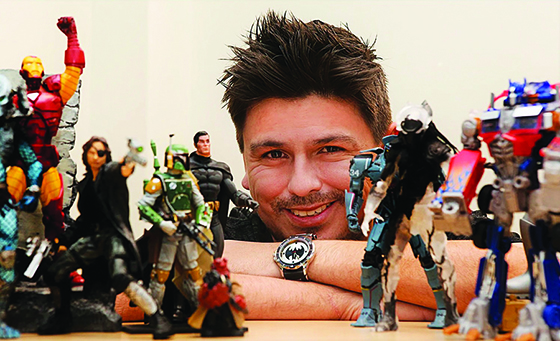
By Micheal Rios, Tulalip News
After three years of constant hospitalization due to acute renal and respiratory failure caused by undiagnosed lupus, acclaimed artist Jeffrey Veregge passed away on Friday, April 12, following a heart attack. He was 50 years old. He is survived by his wife Christina and their three children.
Following his passing, Christina posted on their shared Facebook account, “We’re heartbroken to share the devastating news that our beloved Jeffrey passed away, unexpectedly, this morning from a heart attack. Our family is in shock and trying to process this unimaginable pain. For 1,025 days he fought lupus like the superhero we knew him to be. The strength, determination and courage he showed while being in the hospital for a total of 925 days was an inspiration to us all. He will be missed more than words can express. This world was a better place because of him.”
A proud member of the Port Gamble S’Klallam Tribe, Jeffrey will be remembered for the remarkable imprint he made on lovers of comic books, action figures, and all things superhero related through his unmistakable, formline reimagining of iconic Marvel and DC characters.
As a Tulalip News reporter, I’m so grateful to have had two opportunities to interview and profile the self-described Salish Geek, first in 2015 at PechaKucha Seattle volume 63 and again in 2020 after his Native American heritage collaboration with Marvel Comics. Using the best parts of those previous interviews, I now share with our readers a profile on the man, the myth, the legend, Jeffery Veregge.
________________________________________
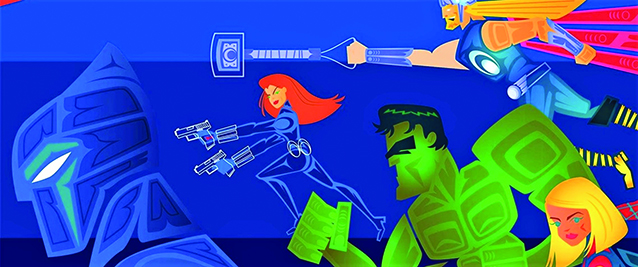
Jeffrey Veregge is an award winning Native American comic book artist from the Port Gamble S’Klallam Tribe, located in Kingston, Washington. His work uses Coastal Salish and contemporary graphic design techniques that created the look dubbed ‘Salish Geek’ by his creative peers. Along with his work for IDW Publishing, he has appeared in numerous websites and publications such as Fast Company Magazine, Cowboys and Indians, and Wired Magazine. His works and commissions are part of some prestigious collections located at Yale University, Washington State University, The Burke Museum and the Seattle Art Museum. He’s also the pop and nerd culture contributor for Indian Country Today Media, where he is known as NDN Geek.
“I was raised and spent a majority of my life on our Port Gamble reservation known locally as Little Boston. Although I am enrolled there, I am also both of Suquamish and Duwamish ancestry,” said Veregge of his Native American roots. “I am an honor graduate from the Art Institute of Seattle, and I have had the privilege to study with Tsimshian master carver David Boxley for a short time, learning the basics of Salish formline design.”
Veregge has been an artist since the moment he was able to hold his first action figure and created stories of his childhood superheroes on paper with whatever art utensils were available. That creative fire and passion for superheroes and comics never faded and eventually led him to the Seattle Art Institute where he studied industrial design technology. Later, he was fortunate to study with Boxley to learn Salish formline design, a traditional style that he would blend fluidly within the Marvel and DC universes
“My most popular works are a reflection of a lifetime love affair with comic books, toys, TV and film; taking my passions and blending them with my Native perspective,” he said.
After graduating from the Seattle Art Institute, Veregge had a great job at an advertising agency for eleven years. Working in advertising allowed him to tap into his creative side, but the Native artist within wasn’t satisfied, he needed something more. He went to art school to be an artist and to have fun, not to have his inner artist constrained by the everyday politics of advertising.
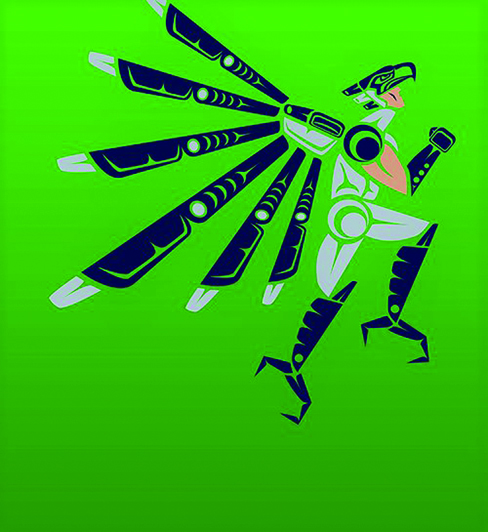
For him, being an artist wasn’t just to sell art and make money; it meant having fun, it meant viewing a blank piece of paper as a magical canvas to express the imagination of a cluttered mind of a Native American who loves comics, movies, Sci-Fi, and action figures. So, he left the advertising agency and embarked on an artist’s mission to create something truly unique. The search for a new, personal and bold direction in his work resulted in Veregge remixing iconic comic superheroes with his now highly tuned hand for formline.
“For me it wasn’t just trying to create art as a geek or nerd, but as a Native I felt like I had something unique to offer,” Veregge said. “That’s my appreciation for all art and design, my passion for heroes, robots, aliens and monsters, and my pride in where I came from.
“My origins are not supernatural, nor have they been enhanced by radioactive spiders. I am simply a Native American artist and writer whose creative mantra in best summed up with a word from my tribe’s own language: ταʔčαʔξʷéʔτəν, which means get into trouble.”
Following that mantra, constantly testing his creative boundaries, and, yeah, getting into trouble a time or two ultimately led Veregge to one solo exhibition opportunity after another to showcase the wonderful world inside the mind of a Salish Geek. Multiple exhibitions of his work were held from 2009 to 2020, the pinnacle of whish was the Smithsonian’s 2018-2020 show at the National Museum of the American Indian, Of Gods and Heroes, featuring two 50-foot murals of Marvel’s heroes battling the Celestials.
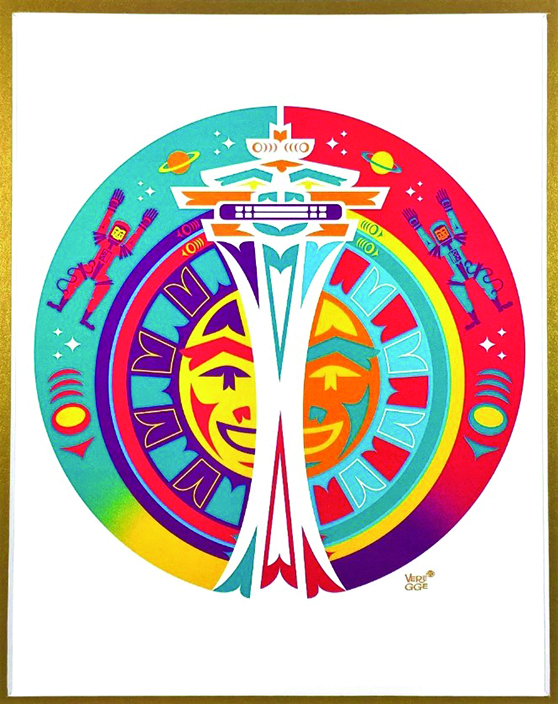
“For thousands of years, Native and non-Native storytellers have used art as a means to share the tales of their people. For me, I am carrying on a tradition that started with my ancestors by simply using the means of today and all its modern conveniences to share the tales that I love. Art evolves, tools get better, but the essence of what I do is the same as those who did it on the canvases nature provided for them to tell the stories of gods and heroes long, long ago” stated the Salish Geek on his website prior to Of Gods and Heroes grand opening.
His explosion onto the highest levels of the art scene eventually meant his one-a-kind designs reached the game-changing creatives at Marvel Comics. It was perfect timing, too, as the comic book goliath was in the midst of developing an all-new collection titled Marvel’s Voices.
“Marvel’s Voices started and evolved from a popular Marvel podcast into a larger program within our comics,” explained Marvel Comics Editor-in-Chief, C.B. Cebulski in a press release. “Our first anthology in this program was released this past February and the reception from fans was incredible. It was clear we needed to do more to lift up more voices and talent and increase representation in and behind our stories. This is the first step of our next expansion of the program to discover new writers and artists who can bring their voices to our characters, both old and new. And this is only the beginning.”
In a cosmic shift for Native American representation, Marvel celebrated Indigenous history in November 2020 with a landmark special, Indigenous Voices #1. Written and drawn by some of the industry’s most renowned Indigenous talent, including none other than the Salish Geek himself, Jeffrey Veregge. Now a celebrated artist, he is leading this super powered movement alongside a team of creators to explore the legacy and experiences of Marvel’s incredible cast of Indigenous characters.
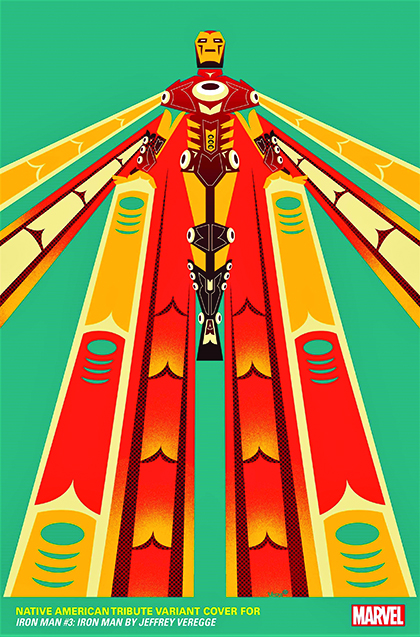
In addition to the Indigenous Voices comic series, Veregge illustrated Native American tribute variant covers for other popular comic titles featuring Dani Moonstar, Black Panther, Iron Man, Captain America, Hulk and others. All depicted in his signature Salish style.
“I am truly grateful for the platform that Marvel has not only provided for me and my work, but with this edition of Marvel Voices, all of Native America,” said Veregge. “This is an opportunity to share the cultural influences that we as Native artists and writers grew up with that will add more depth and dimension to the Native heroes in the Marvel Universe.”
From blockbuster movie goers, animated series streamers, and a very devout base of comic book enthusiasts, there are hundreds of millions of Marvel superhero fans globally. The exposure to the limited-edition Indigenous Voices series and the must-have Native Heritage tribute covers illustrated by Veregge offered immeasurable cross-cultural learning experiences to the traditional Native storytelling and the thriving art scene that is Salish formline.
In a world severely lacking in authentic representation of Native American culture, Veregge reached the highest pinnacle of his craft while elevating Salish formline into the bold and vibrant worlds of comic book lore and museum quality art exhibitions.
Within the pop culture realm, there’s a saying that goes something like “There’s heroes and there’s legends. Heroes get remembered, but legends never die.” The Salish Geek is a f*cking legend.
A delightful beginning at Stella’s Sweets
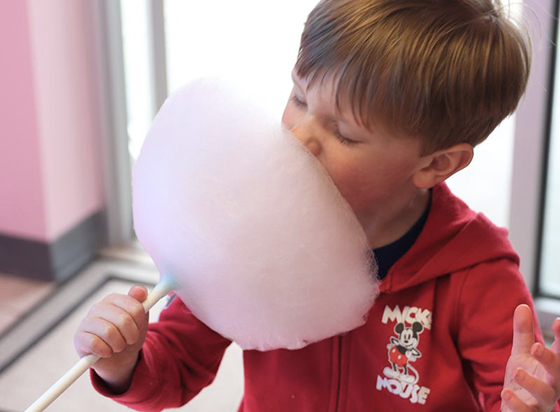
By Wade Sheldon, Tulalip News
Are you craving some sweets? Well, you’re in luck. Stella’s Sweets just opened on 34th Ave, right across from Walmart.
Embarking on a new journey, Tulalip tribal member Samora Joseph and family held the shop’s ribbon cutting on Friday, April 5. Friends, family, and community members showed up in support of the new venture.
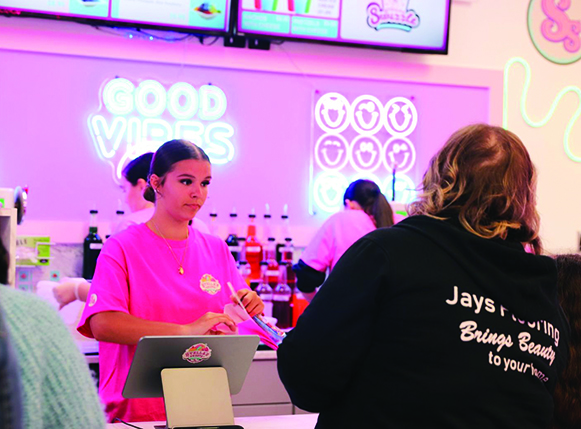
A long line formed outside with folks eagerly waiting to see what was inside. The first thing that catches the eye is a giant cotton candy machine, mixing the fluffy treat. A colorful display of candy, and novelty products leads you to the counter where you can order a variety of delicious treats, including shaved ice, slushies, and ice cream. The fun atmosphere was accentuated by neon signs that read, “good vibes only.”
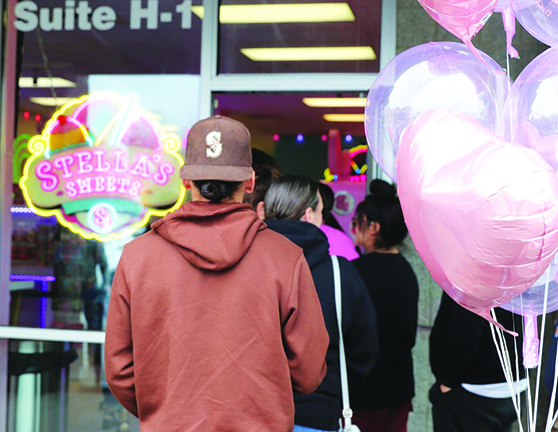
“We started in the concession stand at Boom City and gained quite a following,” Samora said. “Initially, we started the concession stand to teach the kids how to manage a business and show them how to be entrepreneurs. We all really loved shaving ice and selling at Boom City, so we decided to pursue opening a shop full-time.”
Samora expressed pride in owning her business despite encountering various obstacles during its establishment. She said that the most significant challenge was being accountable for the business’s progress while juggling her regular job and raising her children. However, with the support of her older children, who took on additional responsibilities to take care of the younger ones, they overcame these hurdles and successfully established the shop.
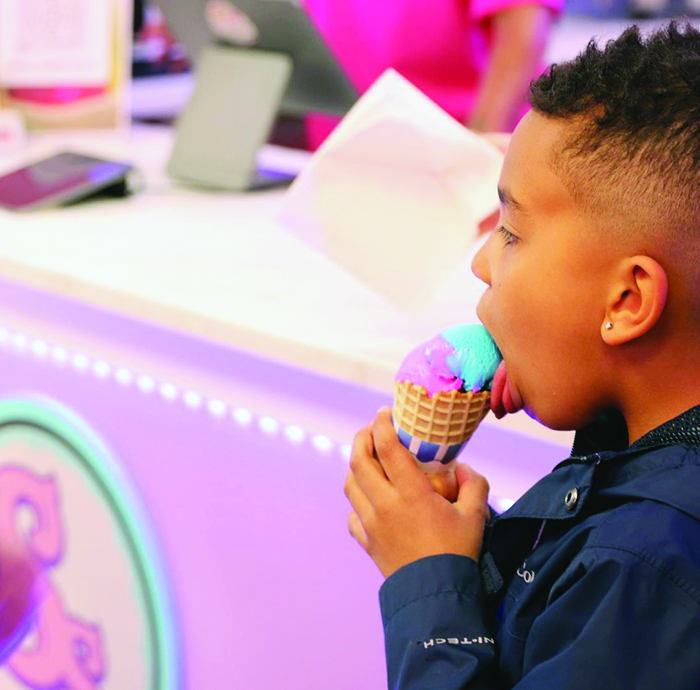
“What excites me the most about this business is that it allows me to instill in my children the belief that all things are achievable,” said Samora, who named the shop after her youngest daughter. “I aim to create a legacy for them and, with any luck, for my grandchildren. It’s satisfying to know that we are providing employment opportunities not just for our family members, but also for the people in our community.”
As the ribbon was cut and the doors swung open, the business welcomed a new era of sweetness and entrepreneurship in Quil Ceda Village. With dedication, perseverance, and a vision for the future, Samora and her family are fulfilling their dream of owning a business and becoming pioneers in their community.
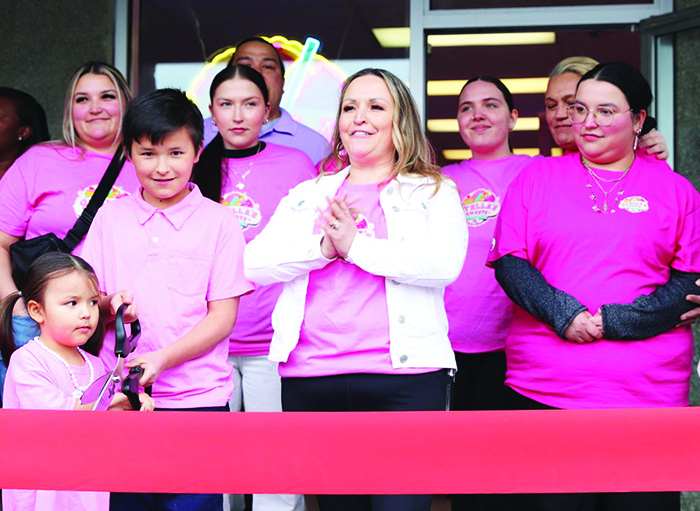
With a heart full of pride, Samora remarked, “So, come get your sweets, scoops, shaves, and ice cream at Stella’s Sweets.”
Swing by Stella’s Sweets at 8825 34th Ave NE Suite H-1, Tulalip, WA 98271. For more information, visit stellas-sweets.com.
High-flying action on the hardwood
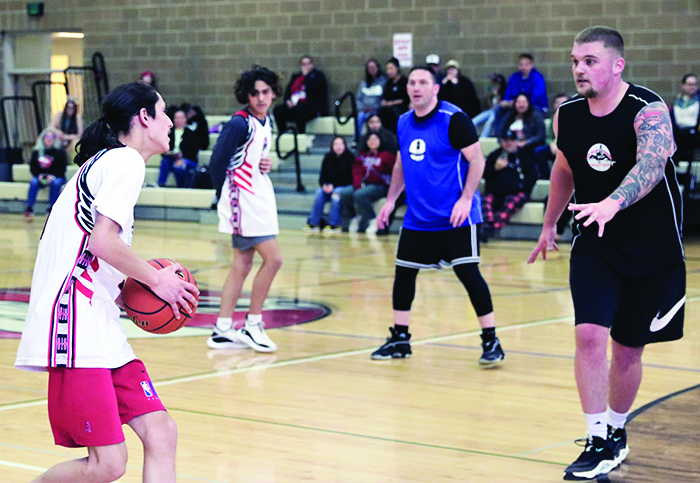
By Micheal Rios, Tulalip News
In a true testament to youth-led organizing, Heritage High School recently hosted an action packed, exhibition game between local law enforcement and the school’s boys basketball team.
Fresh off a deep playoff run that yielded impressive Ws in Districts, Tri-Districts and Regionals, senior forward Damon Pablo wanted to keep the team’s momentum and positive vibes going. His insistence led to the creation of a friendly game that brought tribal teenagers, police officers, and community together at Francy J. Sheldon gymnasium.
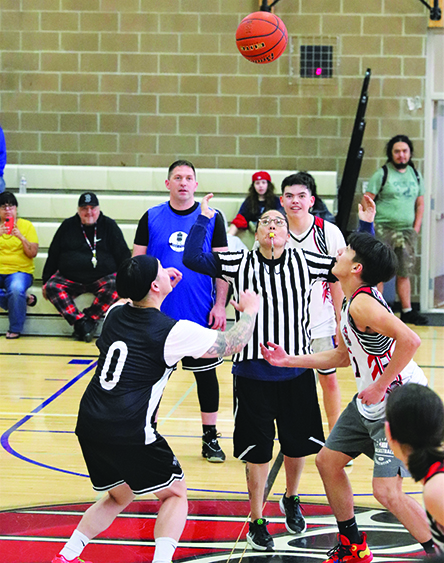
“I first got this idea after hearing about the Heroes and Hoops event held back in December at Marysville Getchell, which had police officers and fire fighters from Marysville playing against one other to benefit Toys 4 Tots,” explained 18-year-old Damon. “A requirement as a Heritage student is to come with three projects a year, and it’s often said we should try to create projects based on things we like to do. One of the main things I like to do is play basketball, and I know our community likes to come out and cheer us on when we play, so, yeah, that’s where the inspiration came from.”
With the assistance of TPD Officer Mike Carrington, Damon coordinated a friendly game of basketball between Tulalip’s local crime fighters and his fellow high school teammates on their home floor. Friends and family of both teams sat in the bleachers and were treated to an exciting back and forth game that was just the right amount of competitive.
Team TPD played to their strengths, which was having the height and weight advantage of actual grown man bodies. They were intentional about getting the ball into the post and attacking the glass for offensive rebounds that would lead to put back opportunities. They also had the services of Officer Phil Powers who is well versed in the art of sharpshooting from behind the 3-point arc. Team TPD jumped out to a 9-0 lead that they stretched to 14-3 midway through the opening quarter.
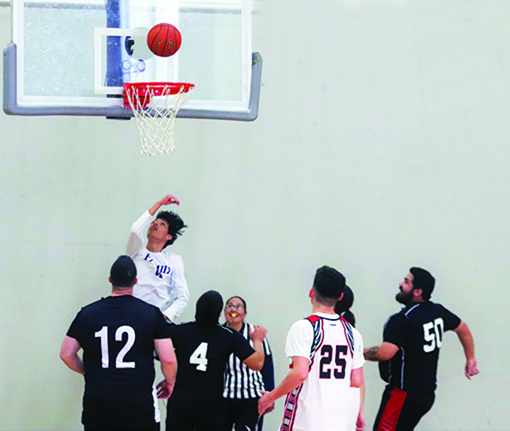
The Hawks would storm back behind a 3-point barrage, led by freshmen phenom Amare Hatch. He was impossible to miss while wearing a festive pair of Easter bunny ears and routinely splashing jump shots over one, two, and sometimes three defenders. His scoring prowess helped his teenager team take the lead, 30-26. However, it would be short lived as Team TPD finished the half on a 7-0 run to regain the lead, 33-28, at halftime.
“It’s my first time ever playing in a game like this and, to be honest, it’s really fun. I’m enjoying splashing threes over the cops,” shared freshman guard Amare during intermission. “I’m wearing the bunny ears for the little kids in the stands. Every time I make a shot and turn towards the fan section, I can see kids cheering and smiling. Seeing their smiles makes me enjoy life a lot more.”
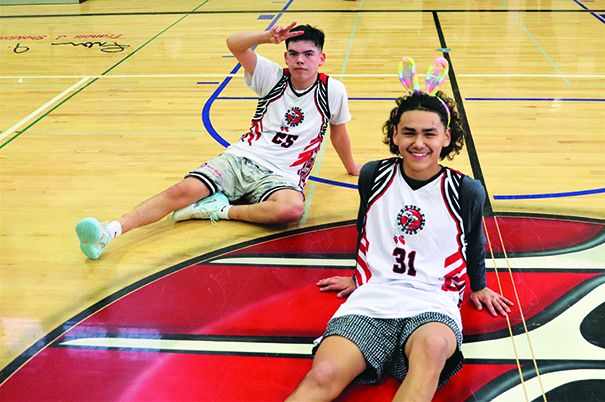
In the 2nd half, the high-flying Hawks executed their brand of rez ball to near perfection. Running and gunning, forcing steals, and showing off their seemingly endless supply of energy. For their effort, they held their largest lead of the game, 57-43, with only five minutes of game action left.
Down by 14 points, Team TPD refused to call it quits. Instead, to the delight of fans who desired a buzzer-beating finish, they went on a heroic 16-3 run to get within just a single point with only 50 seconds remaining.
With the pressure mounting and possession of the ball, the Hawks ran the shot clock all the way to ensure make or miss their opponents would have minimal time to pull off the comeback. When Damon’s 3-pointer rimmed out, Team TPD secured one final possession with only seconds to go. They looked to get a transition bucket, but the Hawks defense got back, seamlessly triple-teamed the police ballhandler, and forced a super contested shot that nearly went in.
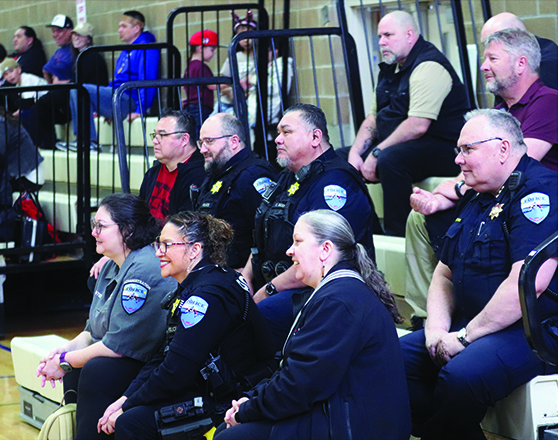
The Hawks collected the defensive rebounder and the final buzzer sounded. They reveled in a hard fought 60-59 W that resulted in one last standing applause from their adoring fans as they exchanged high-fives with Team TPD.
“In so many ways, these positive interactions with the youth are beneficial to our shared Tulalip community,” said Chief of Police Chris Sutter after the game. “Building trust for effective community policing starts with our officers being seen as humans, not just an officer with a badge. Today, the kids and community witnessed a friendly game of basketball that got the competitive juices flowing, but at all times was respectful and lighthearted.
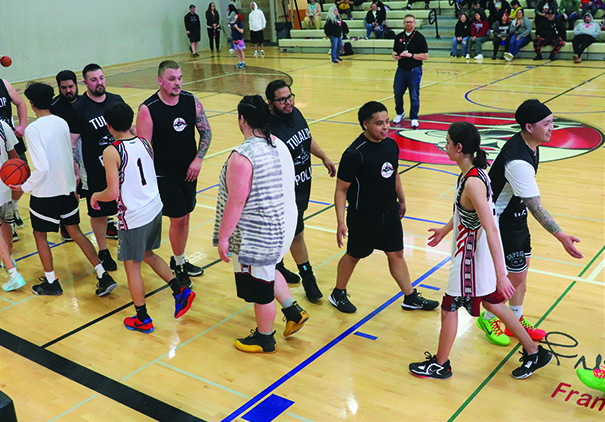
“We definitely would like to see more events like this where our officers can connect and engage with the youth over shared interests. These types of events also serve as the best way to inspire and empower the next generation to pursue careers in law enforcement,” added Chief Sutter.
The late Francy J. Sheldon, for whom the Heritage court is named, would agree wholeheartedly with Chief Sutter’s perceptive. A well-known advocate for everything athletics, Francy excelled at sports as a young man before passing on his decades of experience through coaching. Later in life, Francy proudly answered the call to serve his community as Chief of Police; something that he spoke of proudly to the next generation that he continued to coach well into his twilight years.
April 13, 2024 syəcəb
Use the following link to download the April 13, 2024 issue of the syəcəb
Hawaii/Tulalip connections
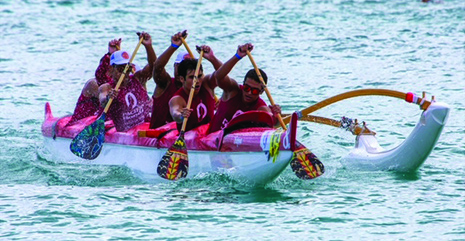
By Lilly Jefferson, Tulalip News Contributor
ʔi čəxʷ, ʔəsčal čəxʷ. Lilly Jefferson tsi s?sda, I recently returned from a trip to Hawaii and wanted to share things I saw and learned.
My family likes to snorkel so we went to tons of beaches while we were there. We went to a beach every day and always left the house with our swimsuits on because we were prepared. But I remember this one beach we went to, we were all in the water snorkeling and we heard this lady yelling at everyone and when we looked up we saw a seal resting on shore. It was awesome! There were other seals, too, all resting around the beach and ten sea turtles were coming ashore.
While we were in Hawaii, we visited the big island and were pleasantly surprised to see Toni Jo Gobin. She shared with me that she moved from Tulalip to Hawaii in June 2016 and absolutely loves her life there. She was willing to share what it’s like calling Hawaii home.
“It’s a blessing to live in Hawaii,” said Tulalip tribal member, Toni Jo Gobin. “It feels like home, it feels like living off the rez. I was a little nervous moving here by myself, just me and my son. But it’s just like anywhere you move where you don’t have no family no ties, no connection. It’s a little scary at first, but we were blessed us with a good place to stay and a good landlord. I thank god for putting people in my life that took me under their wing and introduced me to all kinds of stuff over here that made me feel welcome.”
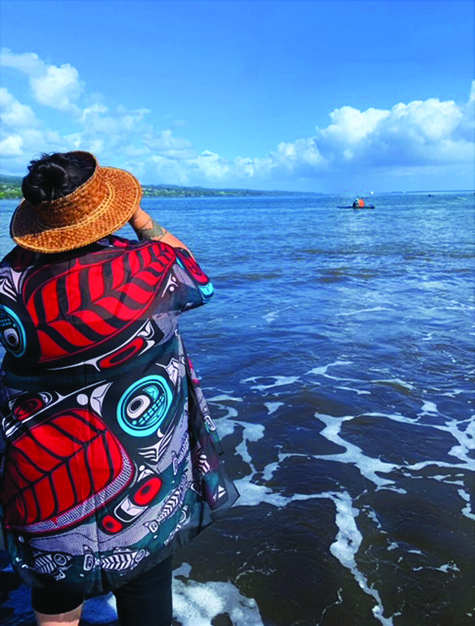
Hawaiian culture is so similar to our Coast Salish culture. For example, they weave leaves from palm trees for headbands and we weave with strips of cedar wood. They use the ukulele, large gourd drums called ipu hulas, and the pahu a bass drum, while we use hide drums, rattles, and clappers.
They even have canoe races. When I was there we met up with Toni Jo Gobin and learned her son has a canoe. It was so cool and they let us go on it. We just so happened to be there when the island hosted their own canoe races! It was so awesome to see all the canoes on the beach. There were so many people racing.
Hawaiian art even resembles Coast Salish art, too. Each piece of art that I came across had its own story. One common art piece you can see in Hawai’i is the Polynesian Triangle. The triangle represents cultural geography, such as Hawaii in the North, Eastern Island/Rapa Nui, and New Zealand/Aotearoa. *
Here in Tulalip, there is a lot of talk of colonization and we tend to think it has only happened to tribes. Really it has happened all around the world. For example, in Hawai’i in 1896 there was a language ban that caused several generations to lose part of their culture. Land and water were also taken from them for military bases, resorts, urbanization, and plantation agriculture. *
Even their Hula dance has been culturally appropriated. It was taken from Hawaiian people and made ornamental for tourism. Meaning the dance had been a showcase for tourists. Hawaii is the most isolated island in the world. It has been overrun by settlers. During World War II, Hawaii was under martial law for seven years. Hundreds of thousands of acres of land were confiscated.
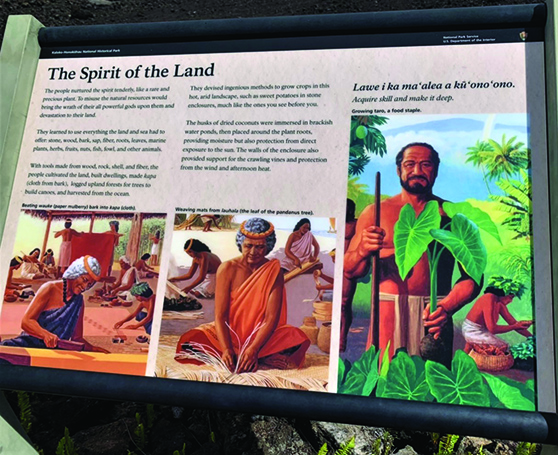
But natives in Hawaii did not let all of that colonization take their culture completely. They still practice their culture and traditional customs to this day. In school, kids start learning their language young so they will be fluent by the time they’re done with school.
While I was there I witnessed a number of ways that the Hawaiian culture continues to thrive, such as creation stories at beaches and waterfalls, luau with adults teaching kids dances, and their traditional language on signs everywhere. These kinds of similarities to cultural revitalization in Tulalip is something that Toni Jo has found comforting while being so far away from Tulalip.
“I’ve always wanted to live here and there are opportunities with education to experience everything Hawaii has to offer,” she said. “Our tribe pays for college education, they pay for school and a lot of the living costs associated with attending a college, like those in Hawaii. I wanted to take that opportunity to show my son that it can be done.”
Toni Jo attended the University of Hawaii at Hilo and received her Bachelor’s Degree in 2021.
In Hawaii there are fishermen, storytellers, language warriors, singers, artists, weavers, and dancers. There are even tribal members like Toni Jo and her son there carving out purpose and creating community with Native Hawaiians who are just like us. They are our island relatives, beautiful and thriving. Just like us.
*Source: https://hawaiianislands.com/blog/the-history-of-hawaii-and-its-culture
Culture Night is back!
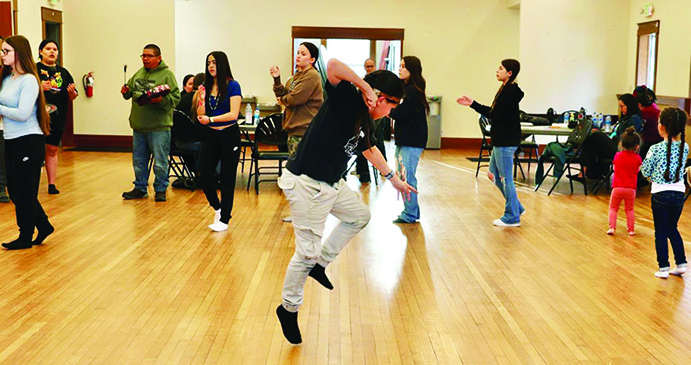
By Kalvin Valdillez, Tulalip News
Over 60 community members helped usher in the spring season on the night of April 9, at the first Culture Night gathering of 2024. For many tribal families, this is a time of year that is dedicated to learning, practicing, engaging, and sharing in the ancestral teachings of the Tulalip people.
With the promise of numerous fun cultural activities on the horizon, including the annual Salmon Ceremony, Canoe Journey, and Spee-Bi-Dah, the Tulalip events department is hosting the weekly Culture Night gatherings, every Tuesday at 5:30 p.m., to help prepare tribal members for the upcoming summertime events.
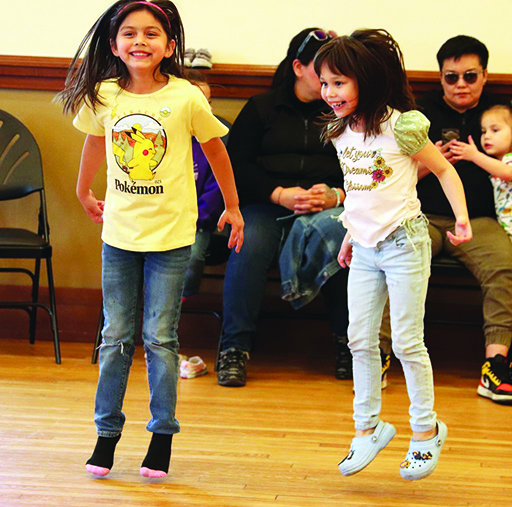
Summer is filled with an abundance of teachings that are important to the tribal nation, such as harvesting traditional foods, plants, and medicines like huckleberries, cedar, salmon, and shellfish. The act of exercising their inherent treaty rights and gathering these items is a significant aspect of the Tulalip culture, which is why it is important for younger generations to learn about the preparation and work that goes into these ceremonies and gatherings, so they can in turn pass it on to the future of the Tribe in the years to come.
At Culture Night, the community gets the chance to learn a handful of Tulalip’s songs and dances that have been passed down throughout the generations. More importantly, they do so at a slower pace, and take the time to show the little ones each step, drumbeat, and chant, so when the time comes, they are able to perform this work at game speed.

Additionally, Culture Night has become synonymous with traditional crafting, due to the fact that many community members utilize the three-hour event to stitch and weave together regalia items for themselves and their families, including shawls, vests, headbands and more. This year, the events department teamed up with the Rediscovery Program for Culture Night. Together, they are making a strong effort to ensure that Tulalip has matching regalia for this summer’s cultural gatherings by providing regalia kits, so families have everything they need to fashion their own traditional attire.
Said Tulalip Events Manager, Malory Simpson, “We’ll be doing kits again this year, so shawl kits and vest kits. And we want to prevent waste, so we’ll be requiring them to check out their kits each week, to make sure projects are completed before they move on. We’re trying to plan, coordinate, and be more uniformed as far as our regalia style. One thing that we will provide this year is a certain color scheme for the material of our regalia.
“I’m excited to see that cohesiveness, coming together as a tribe and representing the Tribe as a whole, overall, in our matching regalia. I really want to see that this year. And if it’s not something that community members want to use, if they want to make their own or use their family colors, they will be responsible for bringing that their selves, but we’ll still have sewing machines and materials available for them to use.”
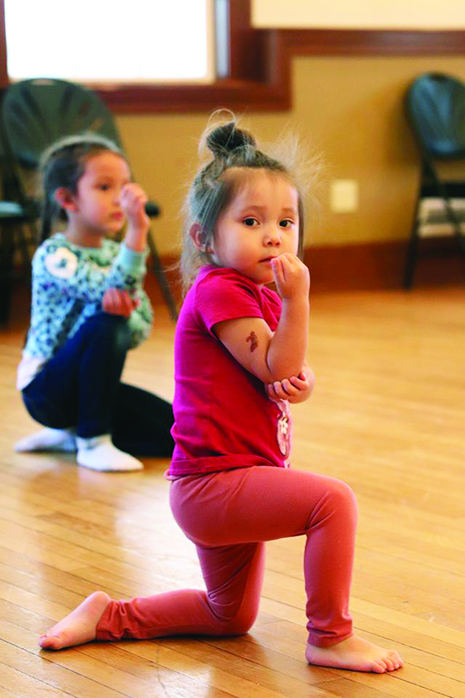
Although the first Culture Night of the year was somewhat lowkey, there was still plenty of buzz in the air in anticipation for the weeks to come, leading up to all those exciting and important cultural events taking place this summer.
This gathering was a great way to get the ball rolling and a wonderful opportunity for the community to share in some fun and laughter together, as well as discuss a number of upcoming events, including the 5:30 p.m. Canoe Washing on Monday April 15, at the Hibulb Cultural Center, and also Salmon Ceremony practice which begins on April 18, at 5:30 p.m., and is set to occur every Thursday at the Gathering Hall until the Salmon Ceremony takes place on June 1. The annual MMIW/P Day on May 3 is another event the community looks forward to participating in each year, and it’s in a space where they are able to put all their teachings that they’ve acquired from attending Culture Night to use, to help spread their healing medicine through that good work.
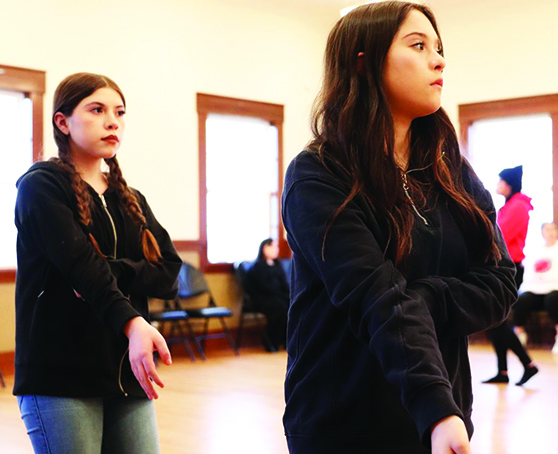
“I’m just excited to gather again and provide a safe place for people to come, enjoy time together, share songs, dance, and learn,” Malory expressed. “This is the time to come out and learn, before we get into the bigger ceremonies. Some people are starting out from ground zero and seeing that growth throughout the weeks is exciting – being able to see that excitement on their faces when they finish their regalia and seeing them at Salmon Ceremony or on Canoe Journey dancing in their regalia, it’s really cool to see all their hard work and their pride when they get to wear it.”
Culture Night is happening every Tuesday from 5:30 p.m. to 8:30 p.m. On April 16, Culture Night will take place at the Tulalip Dining Hall once again. The following weeks, the location will change to the Kenny Moses Building – same time, same day of the week though. Be sure to join in if you would like to craft regalia or practice a few songs and dances with the community.
Reflections from Vietnam Veterans’ Welcome Home Day
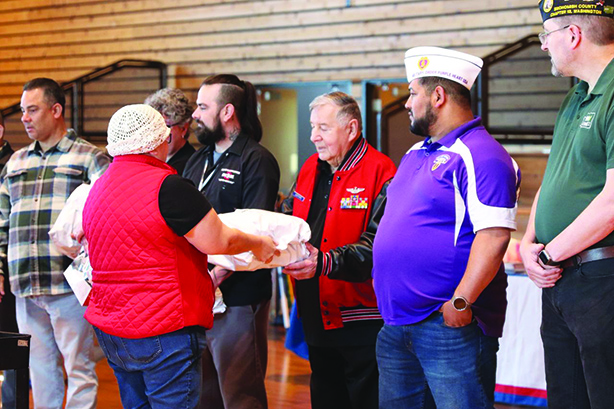
By Wade Sheldon, Tulalip News
On Saturday, March 30, the Gathering Hall became a poignant gathering place as around 100 people convened to commemorate and honor those who served during the Vietnam War. This heartfelt event, known as the Vietnam Veterans Welcome Home Day, was a touching tribute to the sacrifices and contributions of these brave individuals.
Andy James, the event organizer, reflected on its history by stating, “I started hosting this event in 2013 at the Boys and Girls Club. We were shut down when COVID happened, and this one is the first we have been able to have.” The journey to this year’s gathering has been marked by challenges, including the pandemic-induced shutdowns, making this return even more significant.
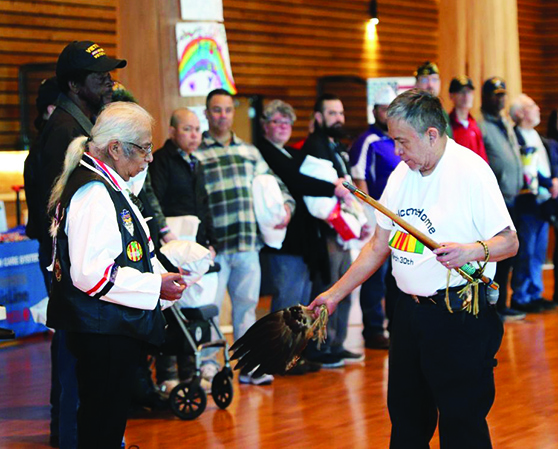
Additionally, March 30 is recognized as Vietnam Veterans Welcome Home Day in Washington State. This day is dedicated to honoring and commemorating the service and sacrifices of Vietnam War veterans. It’s also a day to reflect on the challenges faced by Vietnam veterans upon their return home, as many did not receive the welcome they deserved due to widespread opposition to the war and significant social and political unrest, including protests and demonstrations.
Now, Tulalip’s event serves as an opportunity to express gratitude to those who served during this tumultuous period in history and to remember those who served their country and gave their lives in service to their country.
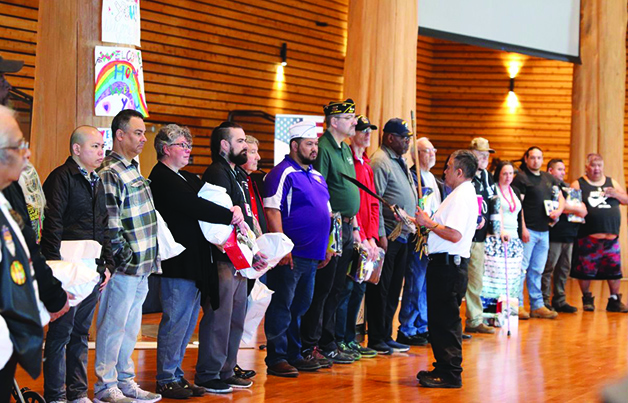
Of the 42,000 Native Americans who served their country during the Vietnam conflict, 90% were volunteers. Among them was Cy Hatch, a retired Gunnery Sergeant from the Tulalip Tribes, who served in the United States Marine Corps and held an E-7 ranking when he retired. This designation meant Cy held a leadership position within his regiment during his 20-year service from 1971 to 1991.
“I didn’t know what to do after I finished high school. I had a brother-in-law who was a Vietnam vet, and he told me to join the Marine Core; I did,” Cy said. “And I managed to make a career out of it, and I’m glad I made that choice. It’s a privilege and an honor to serve your country; I think more people trying to find their way in life should join. I’m thankful for this event; it means a lot for me to stand with my fellow military, be recognized, and enjoy our time together.”
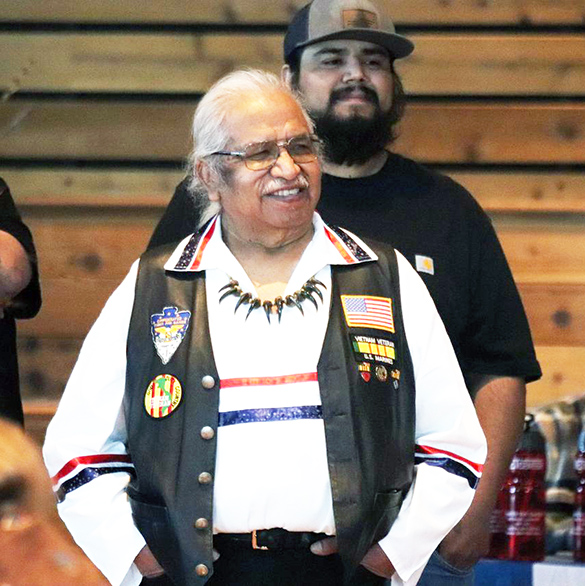
James expressed gratitude for the support received, noting that Governor Jay Inslee signed the Welcome Home Vietnam Veterans Bill in 2013, which has garnered much excitement. “I am particularly thankful to the Tulalip Tribes for their generous offer to host the annual event at the Tulalip Gathering Hall.” As a former Private First Class in the United States Marine Corps during the end of the Vietnam War, James’s motivation for organizing the event is deeply personal. “This is my way of attempting to do something good. Some veterans passed that didn’t get a chance to experience this. I had to do it.” He emphasized the importance of the gathering, reflecting on feedback he’s received: “I have been told this event is so moving and touching, as most don’t get to experience the love our native people extend to its veterans and elders.”
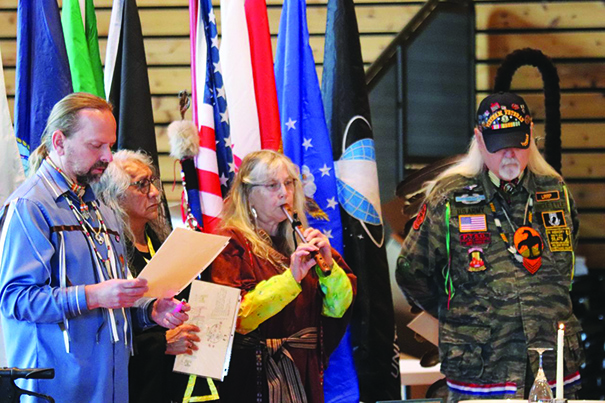
As the event concluded, the camaraderie and appreciation remained palpable. Among heartfelt exchanges, there was a deep sense of gratitude for the opportunity to honor Vietnam veterans. This gathering fostered a sense of community and acceptance, providing solace for the travesties they endured and reaffirming their place within society.
New leadership sworn-in
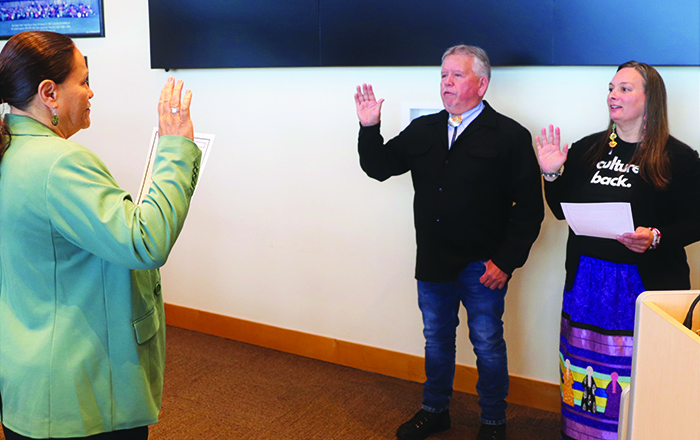
By Micheal Rios, Tulalip News
The latest iteration of Tulalip’s Board of Directors became official on the morning of Saturday, April 6. The regularly scheduled Board meeting began promptly with the first order of business to swear-in the two highest vote getters from March’s general council election: Glen Gobin and Theresa Sheldon.
They replace Pat Contraro, who served one term, and Mel Sheldon, who served for nearly two decades. Mel chose not to run for re-election, while election results showed Pat received the ninth highest total.
After their oaths of office, Glen and Theresa were each given an opportunity to share a few words with those in the room and the many more tuning in on iAmTulalip.com
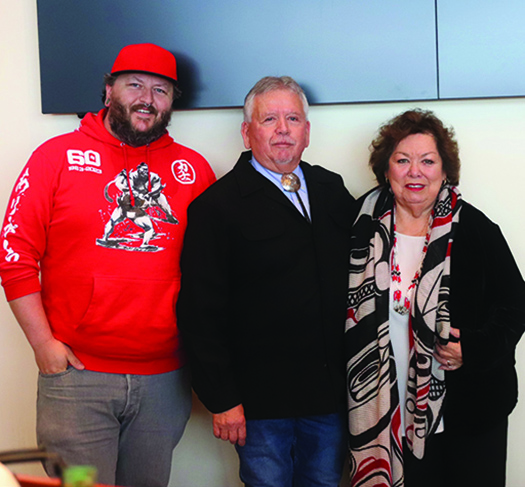
“In many ways it feels like I never left, but in other ways I feel kind of apprehensive for some reason, sitting back up here. I think it comes with the realization of all the responsibility that comes with the position,” admitted Glen. He had previously served as a Board of Director for 15+ years before taking some time off to spend with his family and enjoy the open waters, fishing. “The expectations, by all those who voted for me, are to bring positive change, bring traditional teachings back, and continue to move forward ensuring future generations have the same opportunities we have, if not more.
“I’m glad to be back to help, and look forward to being a part of this team as we work together in the best interest of the Tribe, to move us forward in a good way. Those are the teachings our elders had; it is always about the Tribe first and making sure our membership is secure. Also, I’d like to thank all those who voted for me and encouraged me step forward once more to help the Tribe,” he added.
Glen received the highest vote total during last month’s general election, surpassing all other candidates by a whopping 150 votes.
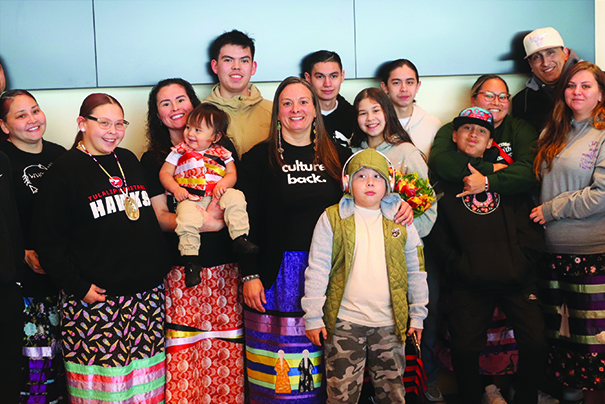
Theresa received the second highest vote total. She returns to the Board of Directors after previously missing out on a second term in 2017 by just nine votes. In her time away, she made a significant impact on Indian Country. First, she served as the Democratic National Committee’s Native American Political Director. Then she stepped down from that position to become Director of Policy and Advocacy for the National Native American Boarding School Healing Coalition.
After getting voted back on to the Board, and subsequently chosen to serve as Madam Secretary, Theresa shared, “I have to first start by expressing my gratitude and love to my babies. This General Council my son, two nephews and two nieces, plus other first-time voters, voted for me as they all voted for their very first time. Understanding I was chosen as the candidate for them, I will never take this responsibility for granted. I must now live up to their expectations.
“Protecting our right to vote, utilizing our right to vote, making sure we have easy access to voting, and voter protection is what I’ve been passionate about for years,” she continued. “I began voter engagement in 2007 and continued to work diligently for Native Vote at the county level, state level, and national level. Never would I have thought back then that my family’s babies at the time would grow up and cast their first vote for me.
“This is a reminder to all those who doubt the power of our younger generation that they have the capacity to create historical change. I am so grateful to our young people and want them to know I hear them and I see them demanding more from all of us; in demanding their language, in demanding their songs, and in demanding their culture. To everyone who supported me,t’igʷicid! To those who did not support me, I will work hard for you, too, as I want us all to succeed.”
For decades addiction, housing, child welfare, economic development, treaty rights and sovereignty have dominated Tulalip’s political discourse. Glen and Theresa both campaigned with an emphasis on their work ethics, diverse experience, and commitment to the people.
Concluding the induction of Tulalip’s newest leaders, Chairwoman Gobin said, “Both of them have served on Council before. They bring so much valuable leadership and knowledge to our team, and I’m excited to see how much we can get accomplished with as strong a Board as we have now.”
April 6, 2024 syəcəb
Use the following link to download the April 6, 2024 issue of the syəcəb